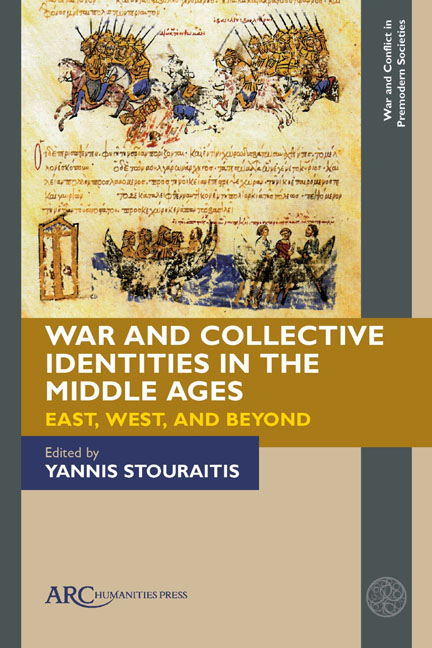Book contents
- Frontmatter
- Contents
- Notes on Contributors
- Chapter 1 War and Peoplehood in the Middle Ages: An Introduction
- Chapter 2 War and Peoplehood through Time: A Sociological Longue Durée Perspective
- Chapter 3 Making War Ethnic: Arab– Persian Identities and Conflict on the Euphrates Frontier
- Chapter 4 Captive Identities: Inscribing Armenianness from Sebēos to Ayrivanec‘i
- Chapter 5 War and Identity in Early Medieval Bulgaria
- Chapter 6 Collective Identifications in Byzantine Civil Wars
- Chapter 7 Warfare and Peoplehood: The Vikings and the English
- Chapter 8 Medieval European Civil Wars: Local and Proto-national Identities of Toulousains, Parisians, and Prague Czechs
- Chapter 9 The Crusades and French Political Identity in the Thirteenth-Century Mediterranean
- Chapter 10 The Song– Jurchen Conflict in Chinese Intellectual History
- Chapter 11 Faithful to a Vanishing Past: Narrating Warfare and Peoplehood in Yuan China
- Chapter 12 War and Collective Identifications in Medieval Societies: Drawing Comparisons
- Selected Bibliography
- Index
Chapter 9 - The Crusades and French Political Identity in the Thirteenth-Century Mediterranean
Published online by Cambridge University Press: 28 December 2023
- Frontmatter
- Contents
- Notes on Contributors
- Chapter 1 War and Peoplehood in the Middle Ages: An Introduction
- Chapter 2 War and Peoplehood through Time: A Sociological Longue Durée Perspective
- Chapter 3 Making War Ethnic: Arab– Persian Identities and Conflict on the Euphrates Frontier
- Chapter 4 Captive Identities: Inscribing Armenianness from Sebēos to Ayrivanec‘i
- Chapter 5 War and Identity in Early Medieval Bulgaria
- Chapter 6 Collective Identifications in Byzantine Civil Wars
- Chapter 7 Warfare and Peoplehood: The Vikings and the English
- Chapter 8 Medieval European Civil Wars: Local and Proto-national Identities of Toulousains, Parisians, and Prague Czechs
- Chapter 9 The Crusades and French Political Identity in the Thirteenth-Century Mediterranean
- Chapter 10 The Song– Jurchen Conflict in Chinese Intellectual History
- Chapter 11 Faithful to a Vanishing Past: Narrating Warfare and Peoplehood in Yuan China
- Chapter 12 War and Collective Identifications in Medieval Societies: Drawing Comparisons
- Selected Bibliography
- Index
Summary
THE ASSOCIATION BETWEEN the French and the Crusades is one familiar to modern historiography. Chateaubriand and Michaud epitomize the nineteenth-century romantic appropriation of the crusading past, anachronistically casting the medieval movement as an early example (and justification) of contemporary French colonialism. The Salle des croisades at Versailles, the invasion of Algeria in 1830, even Sykes-Picot and the Syrian Mandate: all drew on the allegedly unique French genius of the Crusades. In our postcolonial age, this connection remains strong in the popular mind, both within and without France, although it obviously ignores the pan-European nature of the expeditions, which drew— among others— Italian, English, German, Magyar, and Scandinavian participants.
But this perception of the French as integral to the Crusades is not simply a modern invention. Since the eleventh century, these “Franks” or “French”— Franci or Francigene in Latin, from the northern regions of the modern hexagon (especially around the city of Paris), united by a shared langue d’oïl with a high degree of mutual intelligibility— presented themselves as specially linked to the defence of Christendom, particularly in the semi-legendary Matter of France. In the Chanson de Roland and its associated epic songs, Charlemagne is represented as an emperor, but one who has much more in common with a Capetian than a Carolingian. He is the emperor of “France dulce,” not of Rome or Germany; his men the “Francs de France,” rather than the historical Charlemagne's Teutonic Franks. The opening of the later Voyage de Charlemagne shows the emperor, a resident of Paris and Chartres, signing himself with the cross at Saint-Denis before setting out for Jerusalem: the very image of a Capetian king preparing for crusade. Indeed, the Voyage may have been composed in the shadow of the Second Crusade (1145– 1149). But even before the call for the First Crusade in 1095, the connection between the French and combat on behalf of Christendom was clear After his rearguard action against the Saracens of Saragossa, the dying Roland thinks about “dulce France” before committing his soul to God.
- Type
- Chapter
- Information
- War and Collective Identities in the Middle AgesEast, West, and Beyond, pp. 153 - 168Publisher: Amsterdam University PressPrint publication year: 2023



